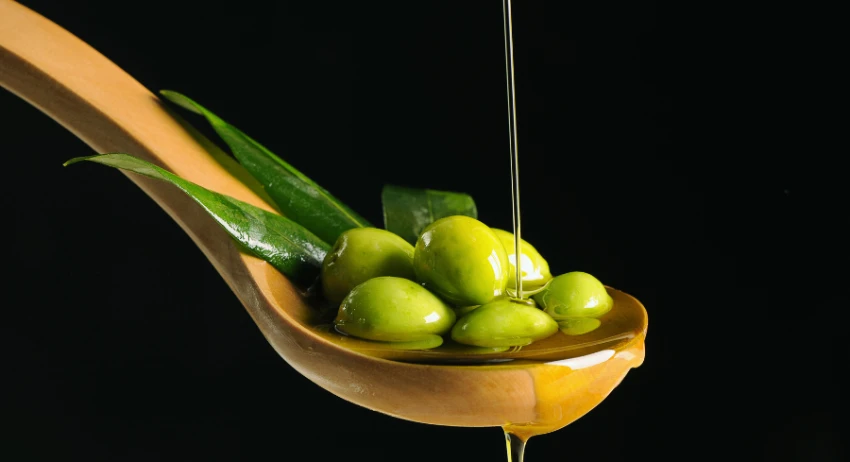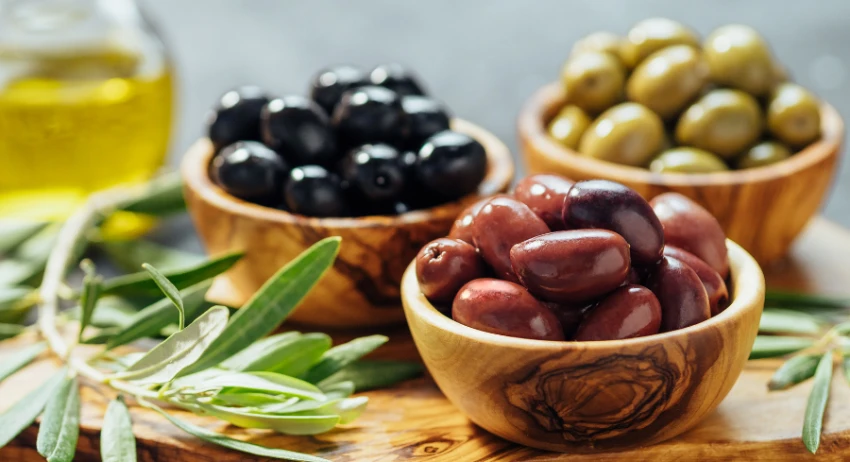Olives are small fruits growing on olive trees, with the scientific name of Olean Europaea meaning ‘European olive’ in Latin. They are known to be one of the healthiest natural food sources and thus are very popular worldwide. Olive fruits come in various varieties depending on where they grow; there are more than a hundred different varieties that people grow just to extract oil. The best climate for their growth is Mediterranean areas, such as South Africa, Pakistan, Chile, Peru, Australia, Oregon, and California; they can also grow in temperate climates, such as New Zealand. In this article, we will discuss various health benefits and side effects of olives and olive oils.
Nutritional Composition of Olive Fruits
People believe olives are one of the healthiest food sources because they have plenty of necessary nutrients, vitamins, and minerals.
- Calories
Every 100 grams or 3.5 ounces of olives contain 114~115 calories, or in other words, an average of 59 calories for ten olive fruits.
- Protein
It varies depending on the type of olive fruit, but on average, every 100 grams of the fruit contains 0.8~1 grams of protein.
- Fat
Olives contain a good amount of fat, usually 11~15%, but 74% of it is oleic acid, a type of monosaturated fatty acid. Monosaturated fats are also called healthy fats because of their various health benefits, such as weight loss and reduced risk of heart disease.
Oleic acid, in particular, provides various health benefits, such as a decrease in inflammation and improved heart health, and according to some studies, it may also help fight cancer.
- Carbs and fiber
Olives are low in carbs, usually comprise 4~6% of the fruit, and most of these carbs are fibers; in fact, 52~86% of them are fibers. So, olives are a poor source of carbs and fiber.
- Vitamins and minerals
As mentioned before, olives are a good source of essential vitamins and minerals, though some of them are artificially added during processing. Following are some important vitamins and minerals present in the fruit.
- Vitamin E: Most high-fat fruits contain vitamin E; it is a powerful antioxidant, and it is essential for the human body.
- Iron: It is a surprisingly important mineral, as it is used to create hemoglobin which helps red blood cells transport oxygen; black olives contain a good amount of iron.
- Copper: Copper is another important mineral essential for the normal working of the human body; its deficiency can increase the risk of heart disease.
- Calcium: We all know how important calcium is to us; it is the most abundant mineral in our bodies. It is an essential component of our bones and is necessary for the normal functioning of our muscles and nerves. Olives don’t contain calcium naturally; it is added to the fruit during processing.
- Sodium: As with calcium, sodium in olives is because of the brine and saltwater used during its packaging.
How to eat Olives?

According to the International Olive Council, 90 percent of all olive verities are for oil production, which leaves only 10 percent that is eaten. But even then, most verities need processing before you can eat them because they are very bitter when raw.
The most common types of table olives that you can eat are:
- Spanish green olives (pickled)
- Greek black olives (raw)
- California olives (ripened with oxidation and then pickled)
Aside from a select few, most olives are fermented and processed before they are ready for consumption. The process varies depending on the local traditions and can take from a few days to months. The fruits will have different tastes, colors, and textures depending on the type of process they have been through.
The fermentation process reduces the fruit’s cholesterol levels and increases beneficial bacteria good for gut health; it also reduces the amount of oleuropein which is abundant in unripe olives.
Lactic acid is an essential part of most methods of olive processing, and it acts as a natural preservative; it protects the fruit from harmful bacteria.
Health Benefits of Olives
Olives are not only delicious but also packed with numerous health benefits. Here are some key advantages of including olives in your diet:

- Help prevent Cancer
Olives contain a high amount of antioxidants and oleic acid, which according to some test-tube studies, inhabit the growth and life cycle of cancer cells. But this is not a piece of conclusive evidence because no one has conducted long-term studies with human subjects. Still, many scientists believe consuming olives reduces the chances of cancer; statistics also seem to point out that this speculation is true.
Olives and olive oils are an essential part of the diet of people living in the Mediterranean region. The rates of cancer and other chronic illnesses in the region are relatively lower compared to everywhere else. Still, there is no conclusive evidence that olives help prevent cancer, as scientific research on the topic is far from enough.
- Boost Heart Health
Oxidative stress can cause harm to your heart, which increases the chances of heart disease. The antioxidants present in the olives and olive oils neutralize free radicals in your body and thus reduce the harm caused by oxidation.
Another common cause of heart disease is high blood cholesterol. As mentioned before, olives contain a high amount of fat, most of which is oleic acid. Experts believe this fatty acid helps regulate LDL (bad) cholesterol, but it is not proven because many believe there is a need for more evidence. Olives also contain an abundance of copper, which can also help improve your heart’s health; copper deficiency is often linked to heart diseases.
- Fight Inflammation
Inflammation might not look like much but chronic inflammation can be a cause of various other diseases, such as psoriasis and rheumatoid arthritis. Olives contain many helpful ingredients that can help fight inflammation, such as monosaturated fats, vitamin E, oleocanthal, and polyphenols; they also help strengthen the immune system. Olives also help in relieving pain, but we advise consulting a doctor before using them for pain relief.
- Improve Bone Health
Osteoporosis is a bone disease where the bones lose their density and mass. Anyone which this disease will have weak and brittle bones that significantly increase the chances of fracture. An antioxidant called Hydroxytyrosol in olives helps prevent bone loss and helps in the formation and maintenance of bones. And like cancer, the rate of osteoporosis is much lower in the people living in Mediterranean areas compared to the rest of the world.
- Improve Digestive Health
As we mentioned before, most edible olives are fermented foods, which means they are rich in beneficial bacteria and enzymes. By consuming them, you add more variety to the gut-friendly bacteria, improving your digestive health. They also have phenolic compounds that halt the growth of some harmful bacteria, such as H. pylori (cause of stomach inflammation).
- Aid Weight Loss
Olives can help in weight loss in various ways, including:
- Monosaturated fatty acids: As mentioned before, olives are a fruit rich in fat, and most of its fat is monosaturated fatty acids. These fatty acids help reduce bad cholesterol levels and increase good cholesterol levels, which makes your body more efficient in burning calories.
- Boost blood circulation: Olives also boost your blood circulation, making you more active and increasing your workout’s effectiveness.
- Decreases hunger: The fats in olives can be very satiating; they make you feel full, so you need to eat less food which means less calorie intake.
- Enhance Brain Health
Fatty acids are a significant component of our brains. And as olives are one of the fattiest fruits on the planet, they are very beneficial to the brain. Monosaturated fatty acids present in the fruit are known to help improve memory and focus, and they also help prevent brain cell death.
And oleuropein, an important antioxidant in olive fruits, helps reduce oxidation damage in the substantia nigra; it is a brain region that is often associated with brain diseases like Parkinson’s disease.
- Lower Blood Sugar levels
Olives have been shown to help regulate high blood pressure, lower blood sugar levels, and help manage diabetes. Although there is relatively little information on this topic, some research show that it may change how the human body makes and reacts to insulin; this can help patients with high blood sugar levels.
- Improve Vision
Oxidative stress can also impact eyes and vision; the antioxidants in olives can help relieve this stress and prevent the damage caused by oxidation. Although there is little research on the subject, some studies have shown that olives are helpful in maintaining eye health.
- Improve Skin and Hair Health
The fatty acids and antioxidants in the fruit are helpful in maintaining your skin and hair and keeping them hydrated. Vitamin E in the olive can help protect the skin from ultraviolet radiation, maintain skin health, and prevent wrinkles.
Potential Side Effects of Olives
Although olives are generally famous for being healthy in both ancient and modern times, they can also cause problems in some situations.
- Allergy
If you are allergic to olives consuming them is a very bad idea. Many people are allergic to olive pollen, but surprisingly few are actually allergic to the fruit. So, you first need to make sure whether you are allergic to the fruit or just its pollen. If you are allergic to the fruit, eating it might cause reactions in your mouth and throat; the severity depends on your sensitivity to the fruit.
- Issues during Breastfeeding or Pregnancy
Excess use of olives during pregnancy and breastfeeding can cause problems, though there is not much information on the subject as of yet. Still, as a precaution, women during this period should stick to using normal amounts and avoid excess to prevent possible problems.
- High Sodium
As mentioned before, processed olives contain a lot of sodium, so overconsuming them can be problematic. We advise eating 5 to 6 olives per day, and if you have blood pressure issues, you should consult your doctor before deciding on an appropriate amount.
- Can lower the Blood pressure a little too much
As we all know, excess of everything is bad; olive does help if you have high blood pressure by lowering it. But if you are already taking medications, eating this fruit can dramatically lower your blood pressure, so you should consult your doctor before taking olives.
Frequently Asked Questions (FAQs)
Can olives make you Fat?
Yes! But only if you take too many olives for too long, as extra calories from anything can make you gain weight and become fat.
What is the appropriate amount of olives for daily intake?
It is best to limit yourself to 2 to 3 ounces every day to prevent any potential problem, and if you have health issues, consult your doctor, to know the appropriate amount according to your situation.
When to eat olives?
There is no specific time; you can eat them whenever you want, as long as you eat them within your limit.
Can I eat olives raw?
Raw olives have a very bitter taste, making them unfit for human consumption; they taste much better after pickling.